Community Resource Collaborative financial crisis takes toll, impact grows
Far from the corridors of local power, far from multimillion-dollar federal grants and fiscal agents and generally accepted accounting principles, a woman and her three children live in a rented house off Carter Street in northeast Rochester.
This young mother has a job, but she can't afford the $1,550 rent herself. Instead, it is supposed to be paid by Community Resource Collaborative, a local non-profit dedicated to helping people exactly like her: young, poor, recently homeless, a victim of violence.
She moved in last August, said her landlord, Gabriele Vogt. She was indoors, safe, warm and could care for her children. Her care manager with CRC provided the first month's rent and security deposit without a problem.
Her landlord did find it odd that the CRC, a reputable non-profit with a multi-million dollar federal grant, would pay with a handwritten check.
The next month the rent came four days late. From there it got later.
Vogt said CRC's founder and chief operations officer, Tina Paradiso, had an excuse at every turn: The bank wasn't cooperating. Vogt wasn't registered as a payee. The check was in the mail.
"From the get-go all I got was excuses," she said. "It was stupid. She would say, 'Oh, the check went out today,' and it wouldn't have been postmarked until the 7th or the 9th. ... It was just so weird."
Now the checks have stopped altogether. CRC is shut down while multiple sets of investigators try to understand its mismanagement of $7.2 million in federal American Rescue Plan Act funding that it was handling on behalf of a larger collection of social justice organizations, the Neighborhood Collaborative Project.
The 12 other entities in the NCP are collectively missing hundreds of thousands of dollars in rightful reimbursements. They were the first to blow the whistle and are the most prominent victims of apparent misconduct.
Paradiso has declined to comment, even for CRC's internal investigation.
'Our tenant is ... being victimized'

The Neighborhood Collaborative Project organizations are not the only victims, though. In their efforts to understand their own predicament, some of those organizations have begun to uncover a wider web of alleged wrongdoing.
Besides the ARPA grant, CRC also controlled money for perhaps 20 other organizations — mostly smaller, grassroots entities that lacked the structure or sophistication to accept grant money directly. Most are social justice organizations, run largely by people of color.
Then there are the Community Resource Collaborative's own clients: people between the ages of 18 and 24 who have been affected by violence and need comprehensive support to get their lives back on track.
The woman in the house on Carter Street is one of them. After several months she started paying a portion of her rent to CRC, moving her toward independence. But Vogt said she learned that those payments were being made to Paradiso directly with Cash App, a mobile payment service.
The rent is now overdue, but Vogt hasn't made the young woman leave. Vogt knows that she and her children would go back into homelessness, so she's waiting for someone to step in where CRC failed.
"Our tenant is basically being victimized by the very organization that was supposed to help her get on her feet," Vogt said. "Instead they pulled the rug out under her."
How does a 'fiscal agent' help in Rochester?
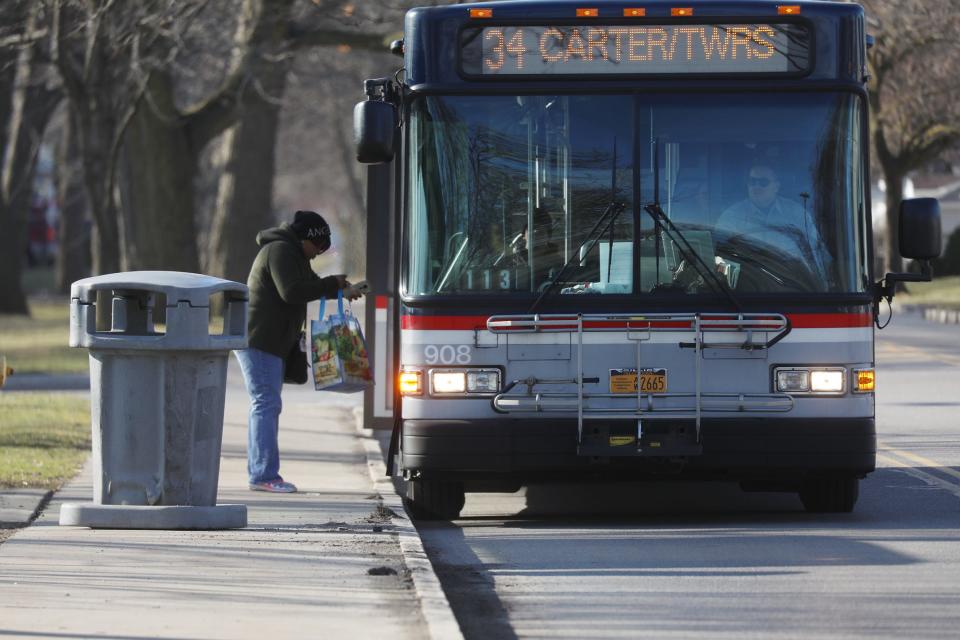
There are many well established non-profit organizations across Greater Rochester with professional staff, model by-laws, well composed boards of directors and regular revenue streams.
But there also countless organizations, initiatives and individuals doing charitable or social justice-minded work without any of that. They are referred to broadly as grassroots organizations. They range from individual people crowd-sourcing funds for projects to small non-profits with relatively little revenue or formal structure.
Grant funding can be a predicament for those organizations.
First of all, only formally recognized non-profits can accept most grants. And even then, the bookkeeping and reporting requirements for using grant money can easily overwhelm a one- or two-person operation.
The solution often is a fiscal agent: a larger non-profit that can formally accept the money and administer the grant, writing checks in exchange for invoices. Fiscal agents usually take a small portion of the grant as a fee for their services.
In the last two years or so, however, word spread among grassroots organizations in Rochester about a deal that sounded like an ideal arrangement.
CRC would administer grants under $50,000 for free.
Smaller organizations relied on CRC
Among the groups attracted to those generous terms was the Community Justice Initiative, a collective of individuals and businesses dedicated to nation-building, activism and self-empowerment in the Black community.
CJI typically relies on small donor funding and crowdsourcing for its work, which includes regular food distributions, educational workshops and the Black Power Marketplace. In the summer of 2023, though, it received its first sizable grant, an $18,500 award from the ESL Charitable Foundation. It would allow them to distribute more food through the To Feed the Village program.
Since it's not a registered non-profit, CJI needed a fiscal agent. They'd heard of Tina Paradiso through other grassroots organizations.
"I trusted the organizations she was working with," said one of CJI's co-founders, Diallo Payne. "And they never charged us for the grant. That was a feature that felt fair and was appealing."
For the first six months, the arrangement proceeded smoothly. Checks came on time and CJI's own financial figures matched what they saw from CRC. They had heard murmurings of issues with other organizations but observed none themselves.
That changed three weeks ago when a check bounced.
CRC's problems made the news a few days later. Of the $18,500 in grant funding, $12,000 is now missing and presumed lost.
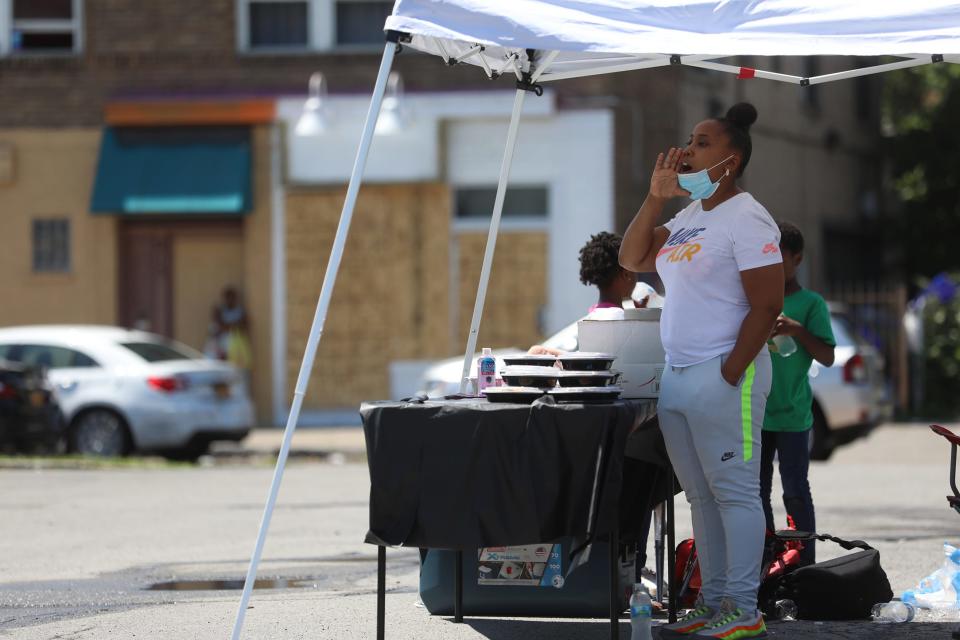
"She put a lot of emphasis on, 'I know I’m a queer white woman and I don’t want to be the white person who gets in the way and monopolizes Black lives,'" Payne said. "She said that a lot, and it came across as genuine."
There is no comprehensive tally of the number of groups and people affected. Some, like CJI, had independent contracts with CRC. Some essentially used Paradiso as an unofficial account, turning their books over to her altogether and asking her help in creating their annual budgets.
Others were sub-awardees on grants that CRC received and administered. In early 2023, for example, CRC won a $500,000 anti-violence grant from the state Division of Criminal Justice Services. The grant application, obtained by the Democrat and Chronicle, shows that $125,000 was earmarked for four small grassroots organizations run by people of color.
Father Tracy Advocacy Center Executive Director Beatriz LeBron said she's counted at least 17 organizations that used CRC as a fiscal agent recently, though not all of them are missing money. Many of those leaders are now meeting weekly to discuss their situation.
For its part, CJI is not stopping its work. Its leaders felt ambivalent about accepting the grant money in the first place for fear of "destroying the essence of grassroots activism," Payne said, and so are disappointed but not shocked to have been let down.
"For us this is a sign we have to look back at our own principles (and) pull together without our own community," said another co-founder, Niya Shabazz. "We’re going to be OK. We’re a nation. ... But there are a lot of people who’ll be affected by this."
Keeping community outreach alive in Rochester
Every Thursday at 1 p.m., a street outreach team from MC Collaborative gathers at the Father Tracy Advocacy Center on North Clinton Avenue and heads north on foot.
Last week there were two red wagons filled with supplies: bagged lunches with tuna fish sandwiches, baked goods donated by Starbucks, thick black socks donated by Bombas. Volunteers steered through dirty piles of snow that melted only begrudgingly in the cold February drizzle.
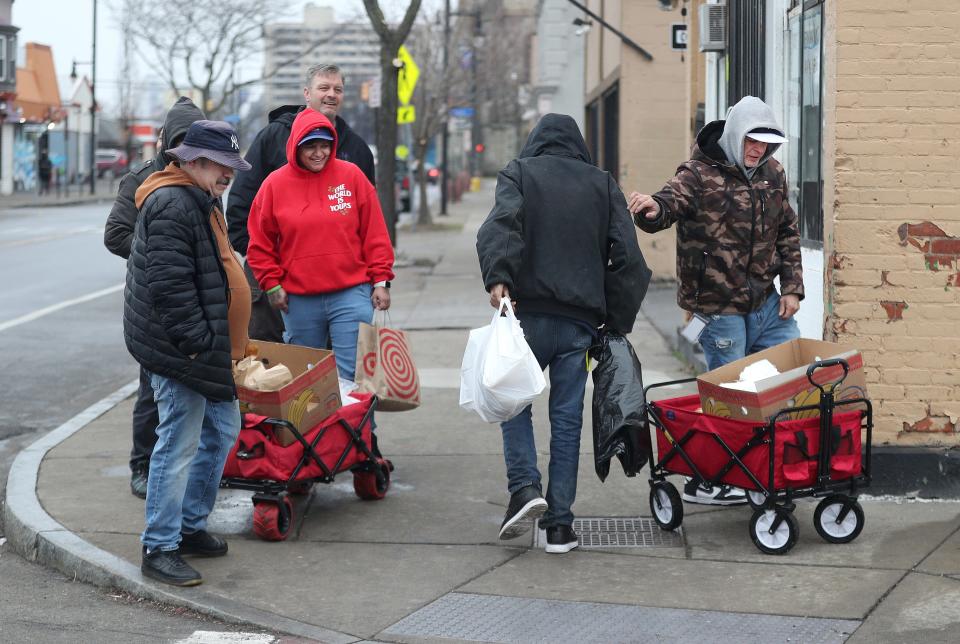
They had no banner or conspicuous clothing to advertise themselves. Before the parade could advance a block, though, people began emerging out of side streets and back lots to meet it, skipping through traffic on North Clinton Avenue to get what they needed.
"I was just saying to someone the other day how I needed a hat!" one woman said, pulling a donated beanie over her ears. The sandwiches, gloves and hats went fast.
The goods are mostly donated but the people who arrange the donations and the outreach walks are supposed to be paid through the NCP grant. MC Collaborative hasn't been paid since its September invoice, co-founder Andy Carey said, a shortfall of at least $30,000.
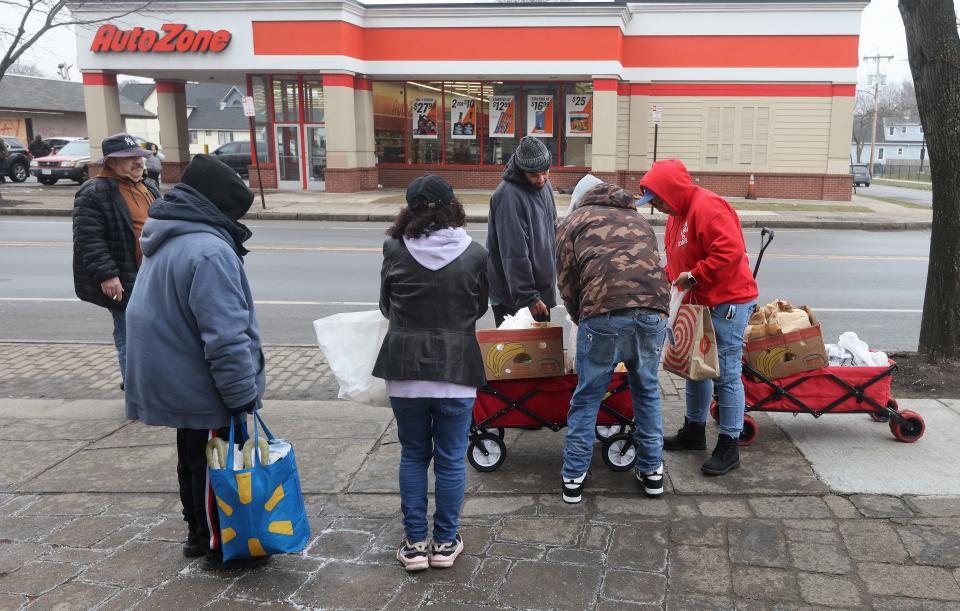
The NCP groups range from community anchors, including programs within Action for a Better Community and Baden Street Settlement, to much smaller organizations like The People's Pantry and On The Ground Research.
The impact that each has felt from CRC's downfall varies. Some have missed payroll or paused certain programs. All are re-arranging their budgets to pay the bills until some solution emerges.
"The severity and effect of these actions within our community cannot be understated," they said in a collective statement last week. "(But) as we navigate these issues, it’s important to remember that NCP’s work is valuable and ongoing."
MC Collaborative hasn't had to cancel any programs or lay people off, Carey said. His greatest concern is that he'll lose momentum, squandering the connections he and his team have painstakingly built over time.
"We've spent a lot of energy over the years being on the same streets on the same days at the same time," Carey said. "If we had to stop and try to restart, it would be a catastrophe."
What happened with CRC in Rochester?
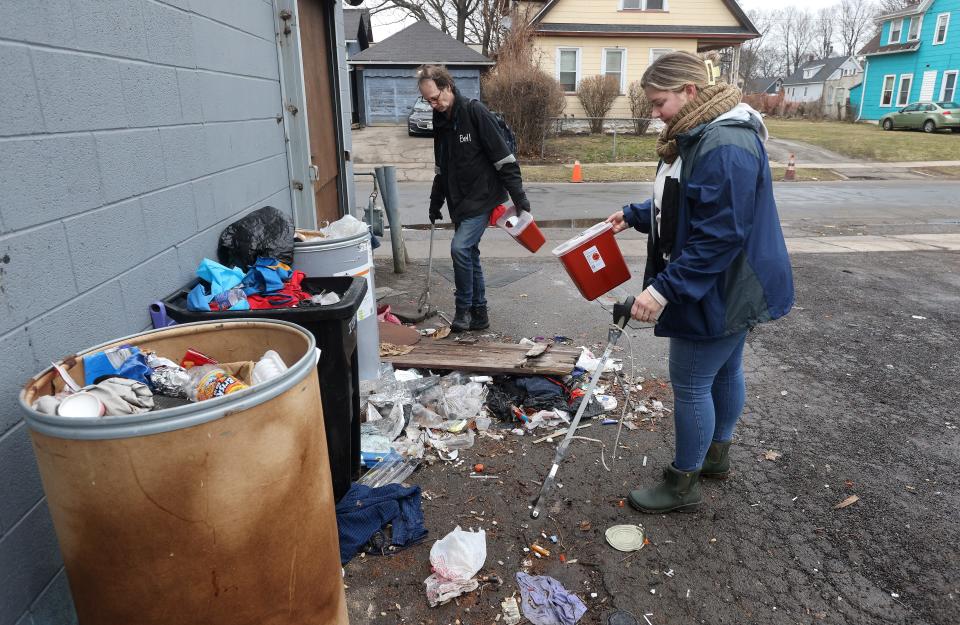
CRC's main mission is not to serve as a fiscal agent but rather to provide young victims of violence with an array of services: counseling, housing, workforce development and more.
That is the work that Krystal Schulik hoped to do when she joined CRC as its director of social services in March 2023. A licensed social worker, she was impressed with its stated emphasis on individualized, collaborative, wraparound care for people in need.
Her job was to make sure the young people who came to CRC for help had all their needs met. She arranged their housing and job training, connected them with any social services they needed and ensured they were clothed and fed.
All those things take money, though. And within a few months of starting, Schulik began to worry about the lack of transparency around the funding sources that formed the foundation of her work.
"I was always kind of blindly working with resources," she said. "Tina would say, 'You've got this!' And I'd say, 'I've got what?'"
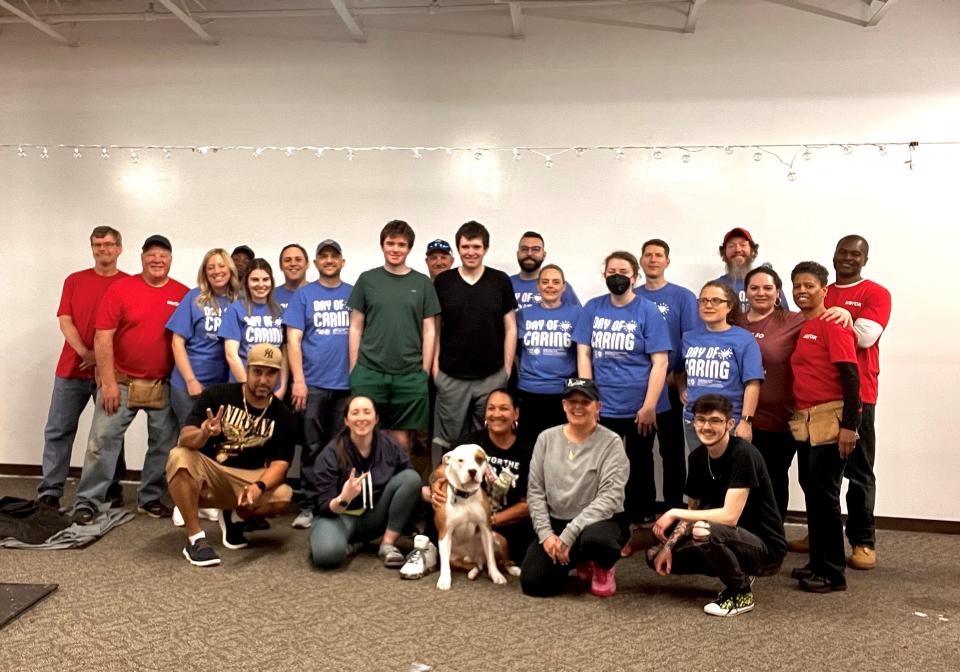
CRC shared quarters on College Avenue with Imprintable Solutions, Paradiso's for-profit print shop. Much of the job training for CRC clients consisted of work at Imprintable Solutions.
Pedro LeBron, the workforce development manager, said it often seemed that the printing business was prioritized over the workforce development mission. Young people were supposed to transition out after three or four months but often remained for longer than that.
"This was supposed to be a launch pad for the kids to go up and out, but behind the scenes it wasn’t happening," said another former employee, human resources director Diane Bardeen. "Kids weren’t leaving; Tina would offer them more money to stay. Or kids would just show up out of nowhere and she’d say, 'They’re interns.'"
There were times, LeBron and Schulik said, that a rush order arrived just as the young people were leaving for a meeting or field trip. In those cases, one of them would be asked to stay behind to print T-shirts or banners while the rest were allowed to go.
By December there were clear signs of unraveling.
The clothes dryer for the young people's laundry broke and wasn't repaired. Printing orders stopped coming in and needed supplies ran low because no one paid the invoices. The literal cupboard where clients could find food was bare.
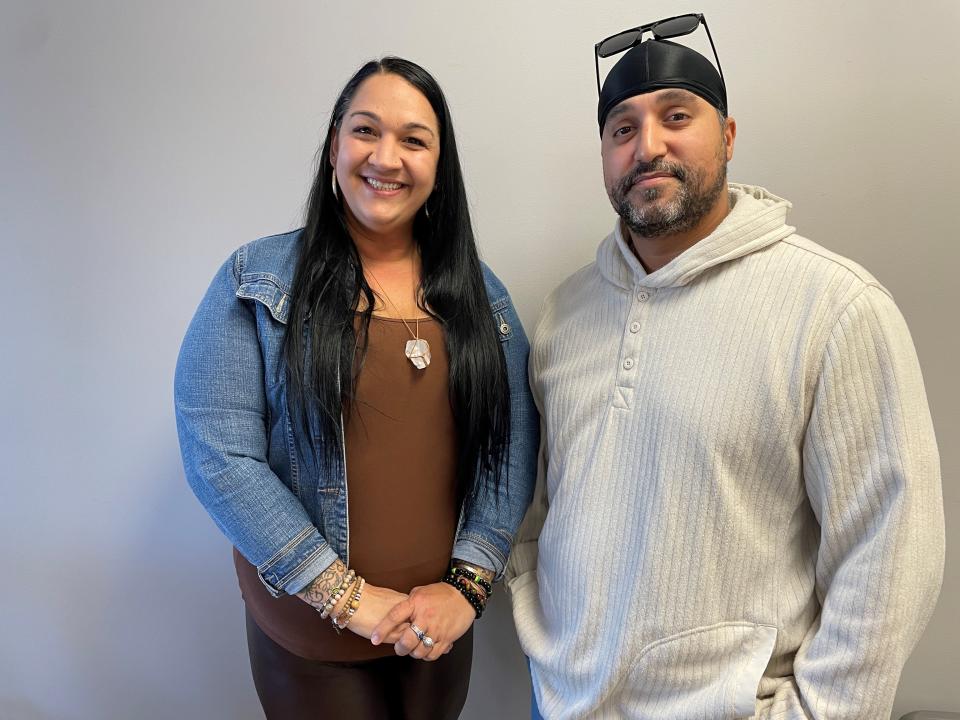
LeBron and Schulik said they concentrated on getting as many people out of the program as they could before it collapsed. They also asked Paradiso not to accept anyone new.
"My first focus was on the young adults – getting them into a job and out of that space," she said. "And I didn’t want any (more) young adults coming into a toxic space. Because we were supposed to be the exact opposite of that."
Since CRC's collapse, Schulik said she has been working on her own time to ensure the young people she served are in a safe place and connected to resources.
She is connecting with her former co-workers and other people she's met through her work, trying to understand what went wrong so quickly. And though some of the revelations have been infuriating, she cannot help a sense of sadness that what she had is gone.
"The way we were working was so collaborative," she said. "It could’ve been groundbreaking. ...
"To be honest, I’m grieving."
UP NEXT in the INVESTIGATION: A behind-the-scenes look at what went wrong for the Community Resource Collaborative. Look for it this week at DemocratandChronicle.com, by Justin Murphy.
— Justin Murphy is a veteran reporter at the Democrat and Chronicle and author of "Your Children Are Very Greatly in Danger: School Segregation in Rochester, New York." Follow him on Twitter at twitter.com/CitizenMurphy or contact him at jmurphy7@gannett.com.
This article originally appeared on Rochester Democrat and Chronicle: Community Resource Collaborative financial crisis takes toll in Rochester

